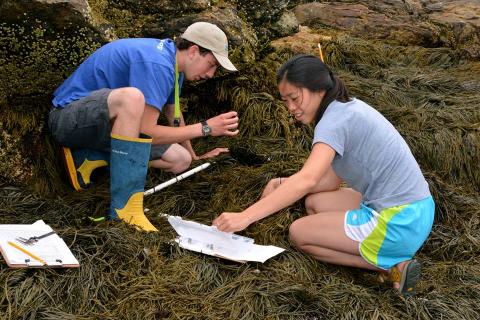Project Overview

Intertidal Ecology Undergraduate Researchers collecting transect data in a quadrat.
The rocky intertidal of Appledore Island has been the focus of student-led projects since the lab’s inception in 1966. The intertidal zone is home to a unique community of plants and animals that are adapted to extreme environmental conditions that include regular wave action, temperature and moisture fluctuations, and changes in water chemistry. The organisms occupying the area of the shoreline between the highest high tide line and the lowest low tide line have unique forms, functions, and behaviors that allow them to persist in this challenging environment.
Undergraduate researchers participating in the Intertidal Ecology program divide their research time on Appledore between two projects. Students spend approximately 7 weeks conducting an independent research project of their design. This project is developed in consultation with one of SML’s subject matter experts who will serve as the primary mentor during the independent research period. Research topics could span organismal physiology, parasite ecology, and community ecology. During the final 3 weeks of the program, students transition their focus to collecting and entering intertidal transect data. This work is critical to maintaining SML’s Rocky Intertidal Monitoring data, which spans the past 40+ years and is critical for evaluating the effects of climate change and introduced species in the Gulf of Maine, as well as documenting shifts in species distribution and abundance.
Two students will be selected for this program, and it is expected that they will work collaboratively to complete the intertidal transect surveys. Students selected for this program will gain expertise in New England intertidal organism identification and ecology, scientific research and data analysis, and excellent training for employment in marine biodiversity surveys.
Prerequisites
Appropriate coursework in marine ecology, marine invertebrates, and/or marine botany is strongly recommended. Interested students should anticipate spending significant amounts of time in the field and be comfortable working in wet (intertidal) conditions and inclement weather. Successful candidates will balance the demands of independent research while also being motivated to work as part of a larger undergraduate research team. Previous relevant field and lab experience is preferred but not required.
Potential Subject Matter Experts for Independent Research
Dr. Carolyn Keogh (Associate Teaching Professor, Department of Environmental Sciences, Emory University)
Dr. Easton White (Assistant Professor, Department of Biological Sciences, University of New Hampshire)
Dr. Amy Fowler (Associate Professor, College of Science, George Mason University)
Dr. April Blakeslee (Associate Professor, Department of Biology, Eastern Carolina University)
Intertidal Monitoring Mentors
Dr. Kylla Benes (Davidson Honors College, University of Montana)
Taylor Lindsay (PhD candidate, University of Rhode Island)
Dr. Jennifer Dijkstra (Research Assistant Professor, Center for Coastal and Ocean Mapping, University of New Hampshire)
Dates: May 30, 2025 to August 11, 2025
SML Research Symposium: August 9, 2025
Stipend: $2100 for the 10-week program
Includes room & board for 10 weeks, and round-trip vessel transportation from Portsmouth, NH to Appledore Island. Researchers are responsible for their own transportation to/from Portsmouth, NH at the beginning and end of the program.
Two researchers will be selected.
To Apply
- Application Deadline: The deadline for 2025 has passed. Please consider applying next year, and check back in January for details.
- Applicants should be prepared to upload (as separate files): cover letter, resume/CV, and unofficial transcripts. Please use the following naming convention for all files: Last_First Name_file title (example: Smith_John_resume).
- Request two letters of recommendation. At least one letter must be from a professor/faculty member. The second can be from a graduate student TA or employer.
- Undergraduates in all majors may apply.
- Prior relevant field/lab experience preferred but not required.
- All applicants will be notified of their application status by email no later than March 14, 2025.
Note for international students: International students studying in the United States under an F-1 visa are eligible to work as a research intern at SML. Before applying, we encourage students to confirm with their academic institution about their eligibility for off-campus employment through a Curricular Practical Training (CPT) or other comparable program.
Questions?
Email shoals.lab@unh.edu
